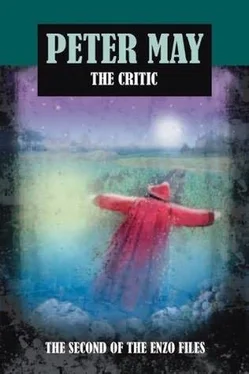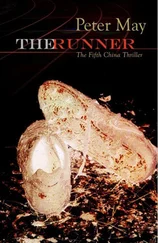Peter May - The Critic
Здесь есть возможность читать онлайн «Peter May - The Critic» весь текст электронной книги совершенно бесплатно (целиком полную версию без сокращений). В некоторых случаях можно слушать аудио, скачать через торрент в формате fb2 и присутствует краткое содержание. Жанр: Классический детектив, на английском языке. Описание произведения, (предисловие) а так же отзывы посетителей доступны на портале библиотеки ЛибКат.
- Название:The Critic
- Автор:
- Жанр:
- Год:неизвестен
- ISBN:нет данных
- Рейтинг книги:5 / 5. Голосов: 1
-
Избранное:Добавить в избранное
- Отзывы:
-
Ваша оценка:
- 100
- 1
- 2
- 3
- 4
- 5
The Critic: краткое содержание, описание и аннотация
Предлагаем к чтению аннотацию, описание, краткое содержание или предисловие (зависит от того, что написал сам автор книги «The Critic»). Если вы не нашли необходимую информацию о книге — напишите в комментариях, мы постараемся отыскать её.
The Critic — читать онлайн бесплатно полную книгу (весь текст) целиком
Ниже представлен текст книги, разбитый по страницам. Система сохранения места последней прочитанной страницы, позволяет с удобством читать онлайн бесплатно книгу «The Critic», без необходимости каждый раз заново искать на чём Вы остановились. Поставьте закладку, и сможете в любой момент перейти на страницу, на которой закончили чтение.
Интервал:
Закладка:
Bonneval led Enzo up a steel staircase to the network of walkways above. He pointed to the tube feeding the incoming mix from the pressoir. It was tied to the rail beside the top of the nearest vat, and you could see the grape juice pulsing through its semi-translucent skin as it thundered up and then out and down again into the vast, black emptiness of a container that held one hundred and fifty hectolitres. Enzo did a quick calculation. That was fifteen thousand litres. Or twenty thousand bottles. A lot of wine.
‘Once the cuve is filled, we let the juice settle,’ Bonneval said. ‘The skins and seeds rise to the top. So we extract the juice from the bottom and pump it back into the top, re-mixing the must to get the maximum flavour. Sometimes at high speed. Sometimes transferring the entire contents of one cuve to another. Which also helps to oxygenate it, which in turn combines with the yeast to produce more heat, and therefore more alcohol.’ He grinned. ‘Another reason why we want to pick the grapes at maximum maturity. Sugar plus heat equals alcohol. And wine wouldn’t be quite the same without the alcohol now, would it?’
‘So you measure the sugar content of the grapes before you pick?’
‘Daily, as we get near harvest time. We also taste-test them for sweetness and flavour. And when the seeds have turned brown, and you can crush them between your teeth, you know they are ripe.’ He turned back towards the cuve. ‘Of course, we also need to control the heat that gets generated during fermentation. Too much heat equals too much alcohol, and you ruin the wine.’ He pointed to large black tubes running around the outer walls of the chai. ‘Cold water. We run smaller tubes down into each tank to feed cold water through filaments like radiators that hang down inside them. That way we can stop the mixture from overheating.’
They went back down to the floor of the chai and walked through to a third shed. ‘We have twenty stainless steel cuves now,’ Bonneval said. Enzo did another calculation and blew a silent whistle through pursed lips. That was four hundred thousand bottles of wine! Bonneval was still talking. ‘Before that we used resin tanks, made from fibreglass.’ He indicated a row of half a dozen tan-coloured tanks with lids that were raised and lowered by an old-fashioned pulley system. ‘But we don’t use them for primary production any more. Before that, the cuves were made of concrete. We store some of our rose in those now.’ He turned to Enzo. ‘But enough of that. Let’s go and taste some of the finished product.’
They went out through huge sliding doors into the dying light. The air still carried the warmth of the day, and even outside was saturated with the smell of fermenting wine. The fields around the chai were full of ripening corn. Bonneval took them past a disused tennis court, weeds poking up through cracks in the tarmac, and a tall, brick pigeonnier built on arches.
‘You see these pigeonniers everywhere,’ Enzo said. ‘People around here must have liked pigeons.’
The lord of the manor chuckled. ‘In Gaillac, Monsieur Macleod, in the middle-ages, they used pigeon shit as fertiliser in the vineyards. So most vineyards had at least one pigeonnier. Of course, they also ate the birds, and a girl with a dowry of pigeons was considered to be a real catch.’
They passed a kitchen garden whose season was nearly over, and went through an arched gate into a courtyard bounded by the main chateau on the south side and long, low wings to the east and west. The west wing had been the chai, or wine cellar, since the nineteenth century, Bonneval said. The east wing had been the original chai, then later provided stabling for the horses. The chateau itself, a patchwork of new and old brick, cement and stone, had seen better days. It was impressive nonetheless, standing foursquare at the end of a long, straight, tree-lined drive, its walled gardens just metres from the banks of the river Tarn. The original house was built on three levels, and then extended on two at either side some time later.
They went up steps to the main door and into a dark, stone-flagged hall. At the far end of it, tall wooden doors stood ajar, opening into a circular room whose walls were lined with elaborately framed mirrors and paintings. It was a clutter of antique furniture and family heirlooms.
But Bonneval took them east, down a long corridor lit by north-facing windows. All the doors opened into south-facing rooms. ‘To harvest the summer sun, and protect us from the north wind,’ Bonneval said. ‘Our ancestors knew a thing or two about designing buildings.’
Enzo became aware now of the smell of good things cooking, and his host opened a door into the family apartment, where they were greeted by a soft, warm light and the gentle, welcoming smile of Jacqueline de Bonneval.
Enzo let the smooth velvety liquid fill his mouth, breathing in through his nose, and experiencing the wonderful flavours and aromas of toasted oak, rich red fruit, and spicy pepper. As he let it slip back over his throat, it left a slight acid freshness on his tongue, and long after his mouth was empty, there lingered hints of blackcurrant and liquorice. For several moments he was completely absorbed by it, before looking up to find Laurent de Bonneval watching him with wide-eyed anticipation. ‘Well?’
Enzo shook his head, trying to find words to describe his feelings about the wine. He swirled the deep, garnet-red liquid in a wide-bottomed glass that tapered up to a narrower lip. And in the end, he gave up. ‘Fabulous,’ was all he could find to say, aware of how inadequate that was.
Bonneval beamed nonetheless. ‘It’s our cuvee speciale, 2002. Petty liked it, too. A blend of cabernet, braucol, duras, and syrah. Aged in oak, of course. You know, we decant the wine from the barrels from time to time and move it around. Every barrel is different, you see, so it helps with the consistency. And the oxygenation improves the ageing.’ He put a confidential finger to his lips. ‘But don’t tell anyone.’ He grinned and filled Enzo’s glass as his wife served up platters of confit de canard and cubed roast potatoes with garlic and cepe mushrooms.
Jacqueline de Bonneval was not at all what Enzo had been expecting. She was a small, plump lady with an unlined, pretty face. Her hair was the colour of brushed steel, thick and luxuriant, and drawn back in a bushy ponytail at least six inches longer than Enzo’s. It had been hard to put an age on Bonneval. Early fifties, Enzo had thought earlier. But meeting Madame de Bonneval he had been forced to reassess his first impression. She was nearer sixty than fifty, and unless she was a good deal older than Laurent, Enzo must have been about ten years out in his initial appraisal.
‘I like your ponytail,’ she said to Enzo as she pulled in a chair to the table.
Enzo said, ‘You know, when I was first in France, and my French wasn’t what it is now, I always used to mispronounce that, and I never knew why people were laughing.’ Neither Jacqueline nor her husband could guess at how me might have mispronounced it. So he demonstrated. ‘ Cul de cheval,’ he said, and they both burst out laughing. It only took a slight mispronunciation for “horse’s tail” to become “horse’s ass”. Enzo smiled ruefully. ‘I’m older and wiser now.’ He paused, and looked appreciatively at Madame de Bonneval. ‘And you have a much more impressive ponytail than mine, madame.’
They started to eat. The duck was moist and fall-apart tender, with a crispy skin that melted in the mouth. And Enzo thought the potato, garlic, and cepe mix was the best he had ever tasted.
A door opened from the hall, and a tall young man emerged from the gathering gloom of the chateau. His tee-shirt was torn and stained, his green boots blackened by red grape juice. ‘Papa?’
Читать дальшеИнтервал:
Закладка:
Похожие книги на «The Critic»
Представляем Вашему вниманию похожие книги на «The Critic» списком для выбора. Мы отобрали схожую по названию и смыслу литературу в надежде предоставить читателям больше вариантов отыскать новые, интересные, ещё непрочитанные произведения.
Обсуждение, отзывы о книге «The Critic» и просто собственные мнения читателей. Оставьте ваши комментарии, напишите, что Вы думаете о произведении, его смысле или главных героях. Укажите что конкретно понравилось, а что нет, и почему Вы так считаете.












